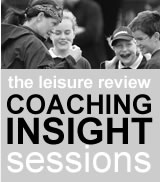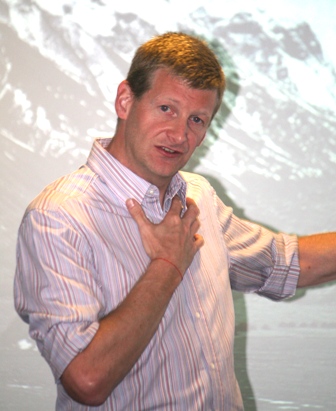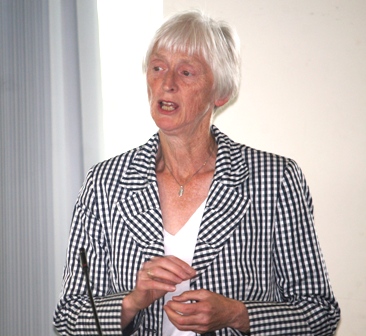
Full details of the five-event Coaching Insights autumn programme are now available.
Making your mindset up: a coaching conference
in Leeds
For a man who likes systems the threads of Pat Duffy’s recent coaching conference were as intertwined as the arrangements that the City of Leeds chooses to make for motor traffic. With sufficient signage Mick Owen found his way round both.

Peter Keen: engaging, lucid and self-deprecating
Driving in Leeds has always been a joyous experience. They have at least two inner ring roads with a multiplicity of numbers and signs which vary from the unhelpfully general “South” to the impossibly parochial “Lower Wortley, Upper Wortley, HMP Armley”. You either have to know how to get where you are going or have the luck of the Irish.
Whether he is lucky or not, one Irishman who has never been short of direction is Professor Pat Duffy of Leeds Metropolitan University, whose department was host to at least three different events over two days in and around Headingley Stadium in the closing days of the summer. The event was supported by Morrisons, the supermarket chain, as part of their partnership with Leeds Met in the development of an integrated and potentially ground breaking coaching for performance programme and the first evening was taken up with an exploration of that programme.
The session followed the first strand of the conference which itself was a continuation of the International Coaches Conference held in Paris, from which a bus-load of members of the International Council for Coach Education had made their way, via Stratford, ostensibly to discuss the professionalisation of coaching but probably to run their collective eye over the new host for the Global Coaching Office while they were up that way.
Global coaching politics are not easily grasped and the nuances of the new office’s base, the choice of debate topic and the presence of so many heavy-duty coaching names all indicate that, even if coaching development in the UK has stalled, should a British government ever decide to get back in the swim at least we will know where the new pool has been built.
The whiff of cordite which floated on the air on the first day grew stronger the following morning when not only Peter Keen, UK Sport’s director of performance, was on the programme but his boss, Sue Campbell, was also booked to appear. Coaches know that sometimes the medium is the message and, with Frank Dick and John Lyle in the audience, the presence of such coaching royalty spoke loudly of something significant afoot.
Whether or not there was an ulterior agenda, Peter Keen’s presentation was engaging, lucid and delivered in a self-deprecating manner which belied both his achievements and the power he wields. As a coach he helped make Chris Boardman the champion he was. As the first performance director of British Cycling he laid the foundations of the success currently being enjoyed by the likes of Bradley Wiggins who, on the day of the conference, moved into the red jersey of the leader of the Vuelta a Espana. Under Keen’s guidance the British Olympic team were ranked fourth in the medal table in Beijing.
Currently it is his job to decide where the millions of pounds which are spent on elite sport are deployed. His mantra for the next Olympic round is “the right money, for the right athlete, for the right reasons” and his time and his mind are so full that he insists on walking the hour home from work every day to allow things to settle. He still finds time, however, to deal with the enquiries and complaints which reach him from parents, coaches and performers who tell him what he is doing is wrong. His response, and the theme of his presentation, is that the people who deliver at the high performance level occupy a parallel world to the one occupied by everyone else. To illustrate his point he had drawn a picture and a diagram of the UK sporting landscape.
His drawing was of a single large and looming mountain with foothills in the foreground dotted with stick people. His analogy was simply that there are a great many people playing a great deal of sport and they are all aware of the mountain in the background but very, very few of them are equipped to even begin to climb it. His diagram was the mountain segmented horizontally with 1,000 people at the bottom and one at the top. As the slope increases the numbers fall away dramatically. One telling assertion which will not be welcomed by the people whose mantra is “you can be anything you put your mind to” was that people who get to the top need a massive support team and are most likely to be guided along the way by someone who has already been there before them. Given that Usain Bolt had only two days previously failed to retain his world 100 metre crown, Keen also said that having climbed the mountain and come down again it was doubly difficult to get back up as “you find yourself weighed down by baggage like agents and endorsements and the like”.
On the subject of mindset, and the ostensible theme of the conference was, after all, “Mindset, practice and coaching: implications for excellence in business and sport”, Keen was illuminating. He has a yen to climb Everest but he knows he will not be doing anything about it just yet. He knows this to be the case because only three of the key mental factors exist. He has had the all important day-dream. He is confident that with his reading around the subject and his skills as a planner he could deliver the last of the three requirements, a coherent series of tangible goals which lead to fulfilment of the dream. What he is missing is the thing which links the two, a clear vision of what he wants to achieve. His vision is obscured by his wife and family who demand his non-work focus and so make clear thought about the six years he thinks an Everest journey would take impossible.
Returning to the disjunction between the people in the foothills and the people on the mountain, he argued that “the pursuit of excellence is often about leaps of faith”. The journeys of the many and the few “are not linked up” and at some point you have to take a risk to cross the divide. Other advice to would-be high-level performers included “not allowing your ambition to be limited by your surroundings” and that “it is always a bumpy ride”.
Nobody in Keen’s position could function without a sense of the politics which surround and suffuse sport, and during discussion with the audience he was clear about what he thinks of the UK sports system. It is, he said, “overblown, top-heavy and very selfish” and, critically, when it comes to talent development “the pathways are nowhere near clear enough”. On the subject of coaching he asked, “Who is doing what?” and then “Is there a strategy linking coaching to the rest of sport?” His answer to the latter question was “no” and his concern was that “coaching cannot sort itself out” – and many in the room believe that it needs to – “in a vacuum of uncertainty about the future”.
As he wound up his presentation Keen moved away from sport and spoke about the arts and particularly about dance, an expressive form which has the power to move many, and he included himself, to tears. He claimed that the professional dancers who regularly produce exquisite performances “put a lot of Olympians to shame” by delivering such “levels of performance 200 times every year.”
Keen was to have been followed by Canadian academic Jean Cote but family issues had prevented him travelling. Duffy had recruited Joan Duda of Birmingham University as a substitute but she too was prevented from attending, in her case by a dog which attacked her. Instead we heard from Dr Eleanor Quested, a member of Duda’s team, and a skilled and erudite presenter. Duda’s and Quested’s work, or the part about which she talked, focuses on the link between the quality of coaching and the engagement of the participants. The argument is consistently made that sport, and by that the advocates always seem to mean coached, or at least facilitated, sport, can bring positive benefits in terms of health, behaviour or social engagement. The point Quested made quite clearly is that only good coaching will achieve these ends; poor coaching will impact negatively on an individual’s motivation to participate and the benefits will thus be lost. She spent an academic length of time on the nature of motivation and indeed introduced that part of her presentation as being “a brief primer on contemporary understanding of motivation”. She even went into the rather murkier world of “achievement goal theory” but her premise was always going to be received well by this particular audience.
Also guaranteed a positive reception, Baroness Campbell of Loughborough, who many in the room have known since she was just “Sue”, was the final speaker of the two days, the slot usually reserved for a “motivational guru”. Would Campbell enthuse the audience and send them back to their day jobs with renewed vigour? The answer involves wooded areas and bears.
Her topic was “Sport and coaching as a transformative force in society” and having been introduced by Duffy as “the main transformer of sport in the last 25 years” she began by defining terms. “Change is easy,” she said. “Transformational change is more difficult.” Having drawn the distinction, she the made it clear how to deliver transformation. “The trick is to embed it in systems,” she said. “Embed it so that it can’t go backwards again; embed it in political and policy frameworks as well as the behaviours of individuals.”
The bulk of her presentation was then dedicated to exploring examples from around the world of where sport has transformed society by engaging, enriching and empowering. Her example from Bangladesh was illustrated by a swimming lesson being held in a fenced off section of a large, muddy river. In response to major fatalities every year in endemic flooding UK Sport’s International Inspirations programme has not only provided children with swimming lessons but has initiated a nationwide swimming teacher training programme and influenced a change in policy which will see all school-aged children exposed to swimming lessons.
Having talked about sport in general, Campbell closed by talking about coaching. “The power of sport to create transformational change lies with our coaches,” she said, although she admitted that she had never managed to get this to happen in her own country, a statement which resonated with her earlier assertion that “coaching in this country is nowhere near where it needs to be.”
There is a refreshing directness about Australians and New Zealanders, and it was evident in the first question Campbell fielded. “You seem like a persuasive woman,” the gentleman from New Zealand said. “After 25 years of trying why have you failed?” Her response was to suggest that it was not her role alone and given that she had been rather busy transforming school sport and elite sport perhaps another individual might bear some of the load. Others in the room pointed to the lack of a voice for coaching and the propensity for coaches to enjoy being cast as mavericks rather than system-builders. It was left to Frank Dick to suggest that, although organising coaches might be akin to herding cats, perhaps it was time to do something about the continuing lack of an independent association for coaches.
Before bringing proceedings to a close, Professor Duffy admitted that he had been biting his tongue but used his closing remarks to suggest that UK coaching is actually part way through a transformational change using the UK Coaching Framework as a vehicle. He reminded the audience that there are plans in place for a UK Coaching Centre of Excellence and stated that “this university stands ready to take its part in that implementation”. He also made it crystal clear that the university was committed to its published strategy driven not by ego, not by one-upmanship but with the “purpose to develop coaches and coaching”.
A major strand of the two-day event was an exploration of the Morrisons Coaching for Performance programme, which is delivering transformational change to the supermarket’s service delivery through coaching. The presentations on the first evening and the interjections of Morrisons’ Norman Pickavance on the second day indicate that the programme needs more space than is available here. Coaching has changed Morrisons and Morrisons might yet change coaching but before that can happen coaching has to change itself. The time for letting someone else take the lead is over and this conference, despite its absurdly low profile and its determinedly laid back approach, should stand as an object lesson; with the right mindset – and the right company – many things become possible.
The Leisure Review’s coaching correspondent is in negotiations with the right people to secure an update on the Global Coaching Framework and an article outlining the Morrisons Coaching for Performance programme.
The Leisure Review, September 2011
© Copyright of all material on this site is retained by The Leisure Review or the individual contributors where stated. Contact The Leisure Review for details.
Download a pdf version of this article for printing

Baroness Campbell of Loughborough: known to some as "Sue"